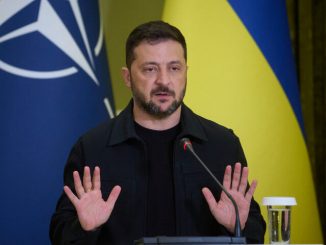
Prime Minister Benjamin Netanyahu and Syrian President Ahmed al-Sharaa, with a map of the Middle East (Illustrative). (photo credit: Chip Somodevilla, Ali Haj Suleiman, KeithBinns/Getty Images)
| Published June 30, 2025
In a dramatic shift that could reshape Middle Eastern geopolitics, Syria’s new interim leader, Ahmed al‑Sharaa—better known as Abu Mohammad al‑Jolani—is signaling a break from decades of hostility with Israel. Since his rise to power following the fall of the Assad regime in late 2024, Sharaa has launched a surprising charm offensive: offering diplomatic overtures, honoring past disengagement agreements, and even floating the idea of joining the Abraham Accords. With Iran’s influence in Syria significantly weakened and regional powers recalibrating, the new Syrian leadership appears intent on redefining its strategic posture—sparking cautious interest and deep skepticism in Jerusalem, Washington, and beyond.
🕊️ Overview of Sharaa’s Strategic Pivot
-
New leadership in Damascus: Since capturing Damascus in December 2024, interim leader Ahmed al‑Sharaa (aka Abu Mohammad al‑Jolani) has projected a conciliatory tone toward Israel and the West. He’s emphasized stability over conflict, saying Syria will uphold the 1974 disengagement agreement, won’t allow its territory to be used to attack Israel, and seeks diplomatic channels instead of tit‑for‑tat military responses.
-
Iran’s strategic decline: The article argues that Iran’s diminished influence post-Operation Rising Lion (and related strikes) has removed major obstacles to normalization between Syria and Israel.
🧭 Sharaa’s Overtures and Diplomatic Moves
-
Backing off military brinkmanship: Sharaa has publicly urged Israel to cease airstrikes and emphasized that mutual security is achievable through non‑violent means
-
Indirect engagement efforts: Mediated talks have reportedly taken place in Azerbaijan, the UAE, and the Syria-Israel buffer zone as preliminary steps to stabilization
-
Tangible goodwill gesture: In May 2025, Syrian officials returned personal items and documents linked to captured Israeli spy Eli Cohen — a symbolic sign of potential rapprochement
-
Interest in Abraham Accords: Sources indicate Sharaa has been open to joining the Abraham Accords, contingent on Israeli military restraint and progress on the Golan Heights
📉 Security & Strategic Implications
-
Iran-Syria alliance eroding: Iran’s retreat from Syria, especially after Assad’s fall, disrupts the Axis of Resistance and weakens Tehran’s ability to deploy proxies
-
Israel’s cautious posture: While recognizing potential benefits, Israel remains wary of Sharaa’s jihadi past and potential jihadist resurgence
-
Regional scramble underway: Gulf and regional actors (Turkey, Saudi Arabia, UAE, Qatar) now play heightened roles—some pushing for a strong, stabilized Syria; others preferring a fragmented landscape that buffers against resurgence of Assad or Iran .
 Implications
Implications
The emergence of Ahmed al‑Sharaa as Syria’s new leader has wide-ranging implications for regional dynamics, global diplomacy, and security calculations:
🔄 Strategic Realignment
Sharaa’s break from Iran and openness to dialogue with Israel signals a potential end to the Iran-Syria-Hezbollah axis that has long fueled instability in the region. This pivot may pave the way for a new security framework involving Israel, Gulf states, and a post-Assad Syria.
🕊️ Prospects for Peace
By expressing willingness to uphold the 1974 disengagement agreement and engage in indirect talks, Syria is laying the groundwork for diplomatic normalization. If pursued sincerely, this could lead to a historic thaw in relations between two long-hostile neighbors.
🔍 Israeli Caution
While Israel welcomes the idea of a less hostile Syria, deep skepticism remains. Sharaa’s past as a jihadist leader raises red flags, and Israel is wary of exchanging one threat for another under the guise of moderation.
🌍 International Diplomacy
The U.S. and Gulf states—particularly the UAE and Saudi Arabia—may gain renewed influence in Syrian affairs as potential mediators and stabilizing partners. The shifting alliances could alter negotiations on other fronts, including Lebanon, Gaza, and Iraq.
🧨 Risk of Internal Backlash
Inside Syria, Sharaa’s pivot may spark friction among hardliners and rival militias. His leadership remains fragile, and any attempt to appear too pro-Western or conciliatory toward Israel could trigger insurgency or factional collapse.
 Overall Takeaway:
Overall Takeaway:
Syria’s unexpected pivot under Ahmed al‑Sharaa marks a potentially transformative moment in Middle Eastern diplomacy. With Iran’s grip on Damascus loosened and overtures made toward Israel and the West, the door to normalization—once unthinkable—has cracked open. Yet beneath the diplomatic gestures lies a complex web of uncertainty: Sharaa’s militant past, fragile domestic control, and unresolved territorial disputes all cast long shadows over this fragile thaw. Whether this marks the beginning of a new regional order or simply a tactical pause in hostilities depends on what follows—both in Damascus and Jerusalem.
SOURCES: THE JERUSALEM POST – ‘Unfolding before our eyes’: Sharaa seeks strategic partnership with Israel in a new Middle East





Be the first to comment